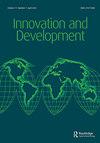弗里曼预测未来的创新和发展研究:为庆祝克里斯托弗·弗里曼100周年诞辰做贡献
IF 1.7
Q3 DEVELOPMENT STUDIES
引用次数: 0
摘要
每一位学者,无论年轻还是成熟,都需要对他们所研究的概念的支持者给予应有的尊重,因为他们创造了他/她想要贡献的知识建筑的基本砖块。这种尊重,通过引用坚定的作者来表达,可能会成为一种仪式:你根本无法避免引用他们。有时,引用有关作者不仅仅是出于尊重,而是因为他们给那些使用他/她的见解、猜想、概念建议和实证研究结果的人留下了深刻的印象。克里斯托弗·弗里曼就是其中之一。作为学生、研究人员,以及至少同样重要的教师,本专题的组织者通过自己的经历深信这一点。当我们引用克里斯·弗里曼的话,或者当我们向学生解释克里斯·弗里曼时,我们指的是一种研究问题的方法,有助于在上下文中理解问题。也许这两个因素是他在创新和发展研究中强大的智力存在的关键。克里斯·弗里曼(Chris Freeman)提供了一个强大的、多方面的聚焦工具来审视问题,即使作为一名欧洲学者,他也没有承担“白人的负担”,因此被认为是一位普遍的思想家,特别是来自我们,以及本特别部分的作者:全球南方的成熟和年轻的学者。我们通过以下案文证明要求对本特别科作出贡献是合理的:本文章由计算机程序翻译,如有差异,请以英文原文为准。
Freeman projected into the future of innovation and development studies: a contribution to the celebration of Christopher Freeman 100th birthday anniversary
Every scholar, mature or young, need to pay due respect to the proponents of the concepts with which they work, because they have created the essential bricks of the intellectual building he/she aims to contribute at. It may happen that such respect, expressed by referencing determined authors, becomes a sort of ritual: you simply cannot avoid referencing them. Sometimes, the authors in question are referenced not only out of respect, but because they had made a deep impression in those using his/her insights, conjectures, conceptual proposals and empirical findings. Christopher Freeman was one of them. The organizers of this Special Section deeply believe this by their own experience, as students, researchers and, at least as important, as teachers. When we quote Chris Freeman, or when we explain Chris Freeman to our students, we refer to a way to looking into problems that helps understanding them in context. Perhaps these two elements are the key to his potent intellectual presence in innovation and development studies. Chris Freeman provides a powerful and multifaceted focusing device to look into problems and, even being an European scholar, he does not bear ‘the burden of the white man’, being thus recognized as an universal thinker, particularly from us, and for the authors of this Special Section: mature and young scholars of the Global South. We justified the call for contributions to this Special Section through the following text:
求助全文
通过发布文献求助,成功后即可免费获取论文全文。
去求助
来源期刊

Innovation and Development
Social Sciences-Cultural Studies
CiteScore
3.70
自引率
0.00%
发文量
24
期刊介绍:
conomic development and growth depend as much on social innovations as on technological advances. However, the discourse has often been confined to technological innovations in the industrial sector, with insufficient attention being paid to institutional and organisational change and to the informal sector which in some countries in the South plays a significant role. Innovation and Development is an interdisciplinary journal that adopts a broad approach to the study of innovation, in all sectors of the economy and sections of society, furthering understanding of the multidimensional process of innovation and development. It provides a forum for the discussion of issues pertaining to innovation, development and their interaction, both in the developed and developing world, with the aim of encouraging sustainable and inclusive growth. The journal encourages articles that approach the problem broadly in line with innovation system perspective focusing on the evolutionary and institutional structure of innovation and development. This focus cuts across the disciplines of Economics, Sociology, Political Science, Science and Technology Policy, Geography and Development Practice. In a section entitled Innovation in Practice, the journal includes short reports on innovative experiments with proven development impact with a view to encouraging scholars to undertake systematic inquiries on such experiments. Brief abstracts of degree awarded PhD theses in the broad area of concern for the journal and brief notes which highlight innovative ways of using internet resources and new databases or software are also published.
 求助内容:
求助内容: 应助结果提醒方式:
应助结果提醒方式:


